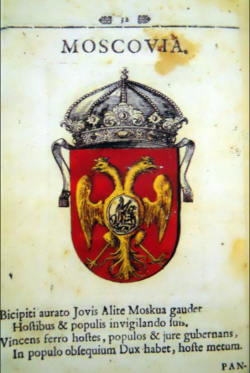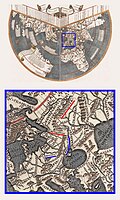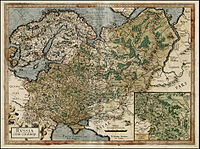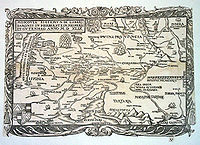|
Moscovia (region)

Moscovia or Muscovy (Russian: Моско́вия, romanized: Moskoviya) is a historical region in Central Russia. The name derived from Moscow and the Moskva river. It was known to its neighbors through the Moscovian state that emerged in the 13th century. Finno-Ugric tribes like the Meshchera people and Slavic tribes such as the Vyatichs lived in the Moscow area. The culture of Moscovia and surrounding lands arose from the Russian people, their lands and rivers such as the Tarusa and Ruza.[1] Name Moscovia was the political and geographical name of the Russian state and the Tsardom of Russia in Western sources, used with varying degrees of priority in parallel with the ethnographic name Russia (Russian: Руссия, romanized: Russiya) from the 15th to the beginning of the 18th century.[2][3] Initially, it was the Latin name of Moscow (for comparison: Latin: Varsovia, Kiovia) and the Grand Duchy of Moscow.[4][5] Later in Western and Central Europe it was transferred to the Tsardom of Russia, formed around Moscow under Ivan III. Various researchers believe that its use was facilitated by Polish–Lithuanian Commonwealth propaganda, which explicitly retained the terminology of feudal fragmentation, denying the legitimacy of the struggle of Ivan III and his successors for the reunification of the Rus' lands.[6] The Latinate Moscovia was not used,[7] entering the Russian language no earlier than the 18th century as an incompletely mastered borrowing. Cartography
See alsoReferences
|



![Moscovia, Russia on territory of Ukraine. 1587 Planisphere[8] Urbano Monti](http://upload.wikimedia.org/wikipedia/commons/thumb/1/13/1587_Planisferio_de_Urbano_Monti._Europe_region_Ukraine_%28Russia%29%2C_Moscovia.jpg/200px-1587_Planisferio_de_Urbano_Monti._Europe_region_Ukraine_%28Russia%29%2C_Moscovia.jpg)







